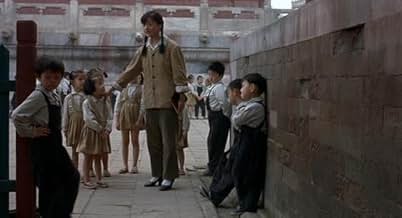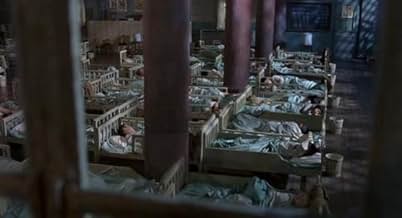Kan shang qu hen mei
- 2006
- 1 Std. 32 Min.
IMDb-BEWERTUNG
6,7/10
1573
IHRE BEWERTUNG
Füge eine Handlung in deiner Sprache hinzuA young boy starting school for the first time struggles to fit in to a strictly regimented society in in post-revolutionary China.A young boy starting school for the first time struggles to fit in to a strictly regimented society in in post-revolutionary China.A young boy starting school for the first time struggles to fit in to a strictly regimented society in in post-revolutionary China.
- Auszeichnungen
- 8 Gewinne & 3 Nominierungen insgesamt
Handlung
Ausgewählte Rezension
The movie begins with a cute four year old boy - Fan Qiang Qiang - being admitted by his father in a boarding kindergarten since both the parents are working at different places and are not in a position to care for him.
The kindergaten is strict in enforcing discipline and expects all students to comply with a set of regulations which extend to an extensive gamut of activities from dressing/undressing by oneself, cleanliness, cordial communciaton to others, respect to elders, maintaining order and even to timely pooping (not to forget the washing of hands thereafter). Every successful compliance by the students is rewarded with the titular little red flower which are diplayed on a scoreboard against their names and any subversion results in forfeit of a flower earned earlier.
Qiang is a free spirit by nature and finds it difficult to comply with the strict routines of the school. He is unable to dress/undress himself and does not play with other children. He is also unable to get over the habit of wetting his bed which results in him being ridiculed as "the king of bedwetting" by other students. Consequently, he is unable to earn any little red flower which is so coveted. When his repeated attempts to conform and fit into his desginated role & behaviour fail, Qiang feels enormous frustration which pushes him down the road of being an aggressive rebel. The rest of the movie narrates how this conflict between a rebellious Qiang and the disciplinarian kindergarten unfolds.
This is a simple movie which, on the face of it, successfully captures the lives of the tiny tots in a rich canvas sparkling with laughter, fun, frolic, tensions, frustrations, helplesness, sadness as experienced by these cute little toddlers. At a deeper and not-so-subtle level, this movie represents a metaphor for the state of Chinese society under the Communist regime. It portrays the simmering conflict in the society between the innate tendency of every citizen to seek to establish their individuality and the efforts of a seemingly kind, yet oppressive state, which tries to micro-monitor as well as manage the affairs of individuals, through a defined regimen, for what it feels is for a loftier goal of collective order and resultant peace. In the process, any expressions of individuality are construed as a subversion of the carefully engineered public order and is brutally subjugated & crushed.
Through the struggles of his charming little protaganist, Qiang, the director, Zhang Yuan, has successfully captured this continuing conflict between conformity and individuality which permeats the Chinese society. He must also be commended for eliciting such authentic and believable performances (if one can call them so, for they appear so natural) from his cute little cast, especially the adorable and expressive Dong Bowen who plays the young Qiang.
The open-ended finale of the movie is apt for it throws several unanswered questions at the protaganist as well as the viewer and initaites a train of thought on the central conflict portrayed in the movie.
Clocking just about ninety minutes, this movie is short, subtle, highly engaging and raises several questions for the viewer on the merits of conformity, group mentality, need for individuality, the conflict between a society steeped on confirmity & group mentality when faced with expressions of individual freedom as well as the effects of such conflicts on individual members of such society.
The kindergaten is strict in enforcing discipline and expects all students to comply with a set of regulations which extend to an extensive gamut of activities from dressing/undressing by oneself, cleanliness, cordial communciaton to others, respect to elders, maintaining order and even to timely pooping (not to forget the washing of hands thereafter). Every successful compliance by the students is rewarded with the titular little red flower which are diplayed on a scoreboard against their names and any subversion results in forfeit of a flower earned earlier.
Qiang is a free spirit by nature and finds it difficult to comply with the strict routines of the school. He is unable to dress/undress himself and does not play with other children. He is also unable to get over the habit of wetting his bed which results in him being ridiculed as "the king of bedwetting" by other students. Consequently, he is unable to earn any little red flower which is so coveted. When his repeated attempts to conform and fit into his desginated role & behaviour fail, Qiang feels enormous frustration which pushes him down the road of being an aggressive rebel. The rest of the movie narrates how this conflict between a rebellious Qiang and the disciplinarian kindergarten unfolds.
This is a simple movie which, on the face of it, successfully captures the lives of the tiny tots in a rich canvas sparkling with laughter, fun, frolic, tensions, frustrations, helplesness, sadness as experienced by these cute little toddlers. At a deeper and not-so-subtle level, this movie represents a metaphor for the state of Chinese society under the Communist regime. It portrays the simmering conflict in the society between the innate tendency of every citizen to seek to establish their individuality and the efforts of a seemingly kind, yet oppressive state, which tries to micro-monitor as well as manage the affairs of individuals, through a defined regimen, for what it feels is for a loftier goal of collective order and resultant peace. In the process, any expressions of individuality are construed as a subversion of the carefully engineered public order and is brutally subjugated & crushed.
Through the struggles of his charming little protaganist, Qiang, the director, Zhang Yuan, has successfully captured this continuing conflict between conformity and individuality which permeats the Chinese society. He must also be commended for eliciting such authentic and believable performances (if one can call them so, for they appear so natural) from his cute little cast, especially the adorable and expressive Dong Bowen who plays the young Qiang.
The open-ended finale of the movie is apt for it throws several unanswered questions at the protaganist as well as the viewer and initaites a train of thought on the central conflict portrayed in the movie.
Clocking just about ninety minutes, this movie is short, subtle, highly engaging and raises several questions for the viewer on the merits of conformity, group mentality, need for individuality, the conflict between a society steeped on confirmity & group mentality when faced with expressions of individual freedom as well as the effects of such conflicts on individual members of such society.
- postsenthil
- 26. Okt. 2019
- Permalink
Top-Auswahl
Melde dich zum Bewerten an und greife auf die Watchlist für personalisierte Empfehlungen zu.
- How long is Little Red Flowers?Powered by Alexa
Details
Box Office
- Weltweiter Bruttoertrag
- 303.898 $
- Laufzeit1 Stunde 32 Minuten
- Farbe
- Sound-Mix
Zu dieser Seite beitragen
Bearbeitung vorschlagen oder fehlenden Inhalt hinzufügen

Oberste Lücke
By what name was Kan shang qu hen mei (2006) officially released in India in English?
Antwort





















